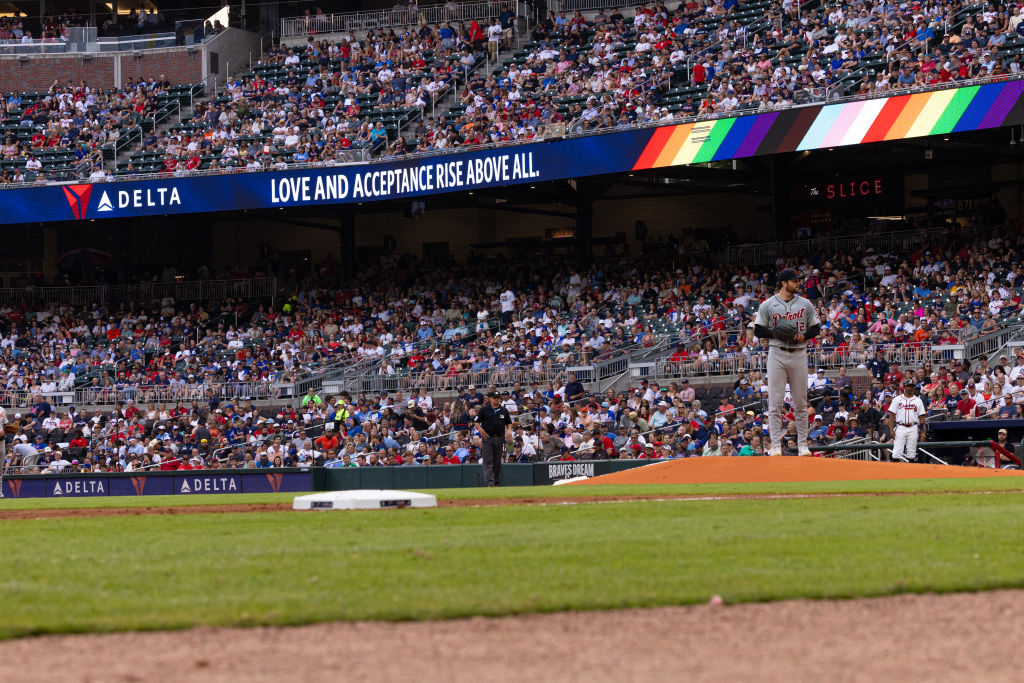More than Freddie Freeman or Francisco Lindor or those Yankee jamokes who tried to rip off Mookie Betts's hand, I will remember the 2024 MLB postseason for the commercials. Specifically, it was impossible to sit through any game across the entire month of October without being forced to watch multiple Donald Trump campaign ads that fear- and hate-mongered about trans people. Here's an example, if you somehow missed them:
That incarcerated people must have access to a high standard of health care should be non-negotiable for all but the most extreme far-right political movements. And anyway, the inclusion of non-incarcerated trans people in these ads makes it clear that, no matter what the most credulous reporters at The New York Times may claim, these spots are meant to attack the concept of gender non-conformity itself.
The experience of watching any negative political commercial is universally dreary, even when you're not the target. But for a trans person, these types of ad made the high-stakes baseball experience a lot weirder than usual. It's not news to any of us that there's a sizable portion of Americans who want to see us eradicated from public life, but it's annoying nonetheless to be told, again and again, that one of two presidential candidates specifically sees you as his enemy. It's depressing to understand that he's running these ads because they appeal to a large portion of his base. And it's uncomfortable, in a way that materially detracts from the baseball you're just trying to watch, that a whole political party has become fixated on the way you and the rest of your community looks and how your bodies work, and you're forced to listen to them go on about it while all you're really preoccupied with is whether or not your Tigers are gonna get some hits off this Cade Smith kid.
Even though thick skin is a necessity in trans life, it still bruises knowing that all your friends and family are hearing these same things simultaneously. A goal of these ads is to make trans people feel vulnerable—to know they wouldn't be singled out if Republicans didn't believe they could be destroyed. And when you're sitting, for example, in an Atlantic City sportsbook with your mostly cishet male co-workers and hearing this ad at full volume, it's not hard to imagine that you are perceived as uniquely weak among this group. An inviting target. It's the exact opposite of how anyone should feel while watching sports.
Major League Baseball didn't care. Executives kept quiet about these ads all through the playoffs, tacitly admitting that they wanted their queer fans to deal with the hate privately—or at least, not caring about those fans as much as they cared about avoiding getting involved in a controversy. I was hoping, this week, that I could laugh in hindsight at MLB's silence, the league brass exposed as cowards and losers. Instead, they are cowards and winners. It's not hard to imagine a scenario where MLB condemned these ads and found itself, once he regained the presidency, on the wrong end of a Trump temper tantrum that, perhaps, targeted its vaunted antitrust exemption. But it has escaped his wrath, for now.
I get the business strategy, is what I'm saying. I've never expected a company I love to be capable of loving me back, and this kind of institutional apathy from the executive class of American society is just something to be worked around until the hatred Trump represents scuttles back into hiding.
Big congratulations to our 45th and now 47th President on an extraordinary political comeback and decisive victory. No nation has bigger opportunities. Wishing @realDonaldTrump all success in leading and uniting the America we all love.
— Jeff Bezos (@JeffBezos) November 6, 2024
When it comes to baseball, however, I keep thinking about Pride Night—the one game a year when most MLB teams make some sort of gesture of support toward the queer community. I've noted before how unfulfilling these theme nights are if you go in expecting something grandly and unambiguously gay—they're most often passive, aloof, and lacking any real creative spark—but at the very least they functioned as some tiny excuse for an excuse to take your most casual-fan friends to a game. In theory, that's the night you're most welcome. But the theory falls apart when MLB turns around and says you're just as welcome to be told you shouldn't exist.
I, personally, will keep going to games—I have a scorebook to fill and hot dogs to eat and dongs to cheer for, and I think Rob Manfred would literally have to beat me with a Louisville Slugger to rid me of my enthusiasm for those things. But I do not claim to be representative of the trans community, and I don't see any way back for Pride Nights as official team events—not after it's been made crystal clear they don't care about us, just our money, and bigots' money too. If years of these Pride Nights becoming increasingly consistent presences on team schedules only led to an autumn spent forcing those same fans to sit through transphobic propaganda or else abandon their interest in baseball, that's a choice a lot of queer folks are going to make easily, and not to MLB's liking.
I can't imagine what purpose Pride Nights can serve beyond making straight people feel heartened or aggrieved, depending on how they voted. When I go to a baseball game, I want everyone on the side of my enemies—who, after this postseason, I know better than ever—to simply leave me alone. We have our own spaces, and we have our own fun. We don't need to attend a party where we're clearly not wanted.






